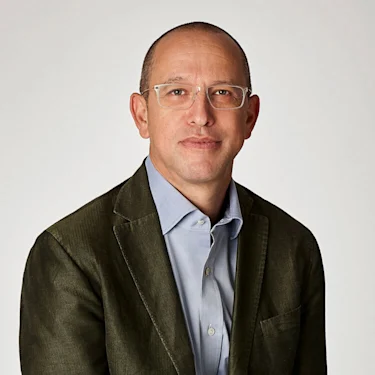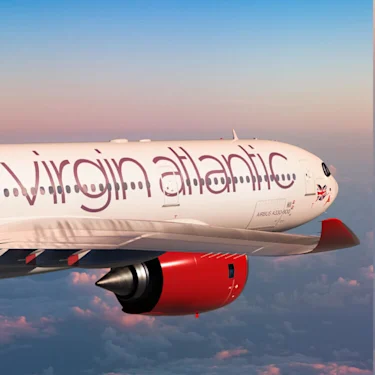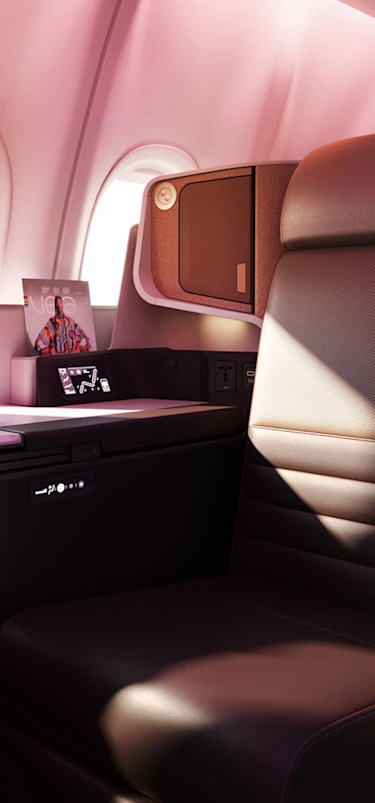Q&A
Aviation
March 8, 2023
Virgin Atlantic CEO on Sustainable Aviation
As CEO of Virgin Atlantic since 2019, Shai Weiss has pulled the British airline back from the brink and put it on a more sustainable flight path. Here, he shares what’s next.•
Words by Jennifer Leigh Parker
Photos courtesy Virgin Atlantic
Virgin is on a bit of a hot streak. British billionaire Richard Branson’s first branded hotel in New York City officially opens this spring with a new restaurant titled Everdene, a private pool club, a swanky 2,800-square-foot duplex dubbed “Sir Richard’s Flat” and a crown-jewel cocktail bar and event space encased by 30-foot glass walls called the Sky Lounge. Spanning two top-level floors and an outdoor observation deck, it’s the kind of space that could launch a brand or break the bank, all in a New York minute.
Almost 10 years in the making, this 1227 Broadway debut introduces the Virgin Hotels Collection, comprising seven lifestyle hotels, into a key gateway market. The company’s future pipeline includes hotels in Miami and London, both serviced by its sister airline Virgin Atlantic.
But Virgin Atlantic CEO Shai Weiss is not here, lunching at Everdene, to talk about hotels.
He’s sitting on even bigger news, and he can barely sit still. Because Virgin Atlantic, jointly owned by Richard Branson’s Virgin Group and Delta Air Lines, is preparing to operate the first “net-zero” transatlantic flight, on a Boeing 787 from London to New York. If all goes to plan, it will be outfitted with Rolls-Royce Trent 1000 engines and powered solely by sustainable aviation fuel (SAF) provided by the biofuels company Gevo.

Made primarily from waste oil and fats, SAF can reduce emissions by up to 80% during its full life cycle, according to the International Air Transport Association (IATA). SAF is considered the most feasible option for reducing aviation emissions in the near term, but it’s scarce and at least twice as expensive as kerosene.
The U.K. government successfully tested SAF fuels on a 90-minute domestic flight in a Royal Air Force military aircraft in November 2022. It is now subsidizing the Virgin Atlantic test flight to prove the same can be accomplished on long-haul commercial flights.
Huge Moves sat down with Weiss to find out how feasible this would-be-historic flight really is. To be clear, no specific date has been set, though the 2023 gauntlet has been thrown down in separate statements by Virgin Atlantic and the U.K. Department for Transport.
Weiss is a former investment banker and Israeli tank commander who beat stage 3 colon cancer into remission and steered a beleaguered airline through the Covid crisis. In early 2019, when he assumed the role of chief executive, Weiss implemented a turnaround that involved cutting nearly half his staff, hitting up investors for emergency funds, ditching old 747s and making cargo a central part of the business.
The results of all this are still playing out in real time, but the last time Virgin Atlantic turned a profit was in 2016. Just this week, the company stated in an email: “We are on track to return to profitability by 2024.”
In person, Weiss is clearly self-possessed and projects profound resilience, like a man on a mission. It’s easy to believe that if anyone could make this happen, it’s him.

The net-zero flight: What’s the single biggest challenge to that occurring?
We’re going to be the first to have a 100% sustainable aviation fuel flight across the Atlantic. This hasn’t been done. In aviation, every first is complicated. The major focus is on the certification of the engines, to ensure the flight is safe. SAF looks, smells and feels like traditional kerosene, so the engines should be able to handle it, but you need to certify that both engines can run on 100% sustainable aviation fuel. Will it happen? Yes, it will. And we’re going to be the first to do it.
How confident are you about the certification?
Of course they’re going to certify it. In the certification, there is a whole process of testing on the ground.
Do you oversee the process?
We do, collectively. Including getting approval from the Civil Aviation Authority, which governs our safety, yes. It will be a safe flight.
Will it be open to the public?
That’s another dimension here. I would love to be on this flight! We’ll see how it goes. Most likely it’s going to be just a flight with very specific individuals. Ultimately, SAF is the fuel of the future. It’s got to be done.
SAF is more expensive, and far more scarce, than regular jet fuel. You’ve said publicly that the cost would have to be shared by all stakeholders. Does that mean you believe that flying should be more expensive?
No. The price of these fuels will come down. It’s new technology. In new technologies, there is an adoption curve. We’ve got to bridge this curve.
There was a so-called golden age when flying was more expensive. Do you think that was right?
I’m not judging right or wrong. What I do know is that we need to have guilt-free travel. There shouldn’t be a choice between growth and green. It shouldn't be either-or; it should be the power of “and.” In the power of and, we must find a way to innovate.
We operate long-haul travel. I can assure you that hydrogen-electric technologies will not change the way long-haul flights are powered for decades. Even if they could, there are thousands of planes. By 2030, there will be more than 6,000 or 7,000 twin-engine, long-haul planes. You can’t just magically make them disappear. We have to find ways of doing things differently. One, you have to have the youngest fleet in the sky. The youngest fleet in the sky reduces fuel consumption and CO2.
You’re saying you’ve got to get rid of old planes?
Yes. And the four-engine planes, and the inefficient planes. Over the last decade, we’ve invested billions in our fleet. We have a seven-year-old fleet, on average, and we’ll continue that. We’ve reduced CO2 emissions by 35% in the last decade. Having the youngest fleet in the sky is a big deal.
How close are you to achieving that status?
When all the new Airbus Neos come in, our entire fleet will be second generation. [Virgin Atlantic operates a fleet of 39 aircraft. The new A330-900neos are designed to be 11% more fuel and carbon efficient than the older Airbus planes they’re replacing.] Right now, we’re at 70% second generation. That’s the biggest move that we can do. The next thing is SAFs, which are about 70% less emitting of CO2 on a lifetime basis versus traditional fuels.
So it’s not perfect, but it’s better.
It’s better. But let’s put things in perspective: Aviation worldwide is 2% to 3% of global emissions. The built environment is 40%. Road transportation is another big emitter. Aviation is a big player, but everyone needs to do their part, because if not, people will start to make a choice whether they want to fly.
Or not.
Going back to prices. The number one thing that will go up is the price. In the years to come it will be more expensive. And consumers, corporations, airlines, oil majors — they all have to participate in ensuring there is sufficient supply. We need to grow the current production of sustainable aviation fuel by over 100 times by 2030. To get to 10%, we will need over 100 times more than what we now have available in the world.
Tell me about this 10% figure.
That is the goal for aviation: to use 10% SAF by 2030.
Is 2030 the first year it could be possible?
With a meaningful number, yes, which is 10%. If you get to 10%, it’s meaningful because you can see a path to 20%, 30%, 40%, etc. And then, of course, technology starts to move.
Are you saying it’s not economically possible?
No, I’m saying that it’s required. I’m talking to my U.K. government; the U.S. has just done this Inflation Reduction Act. I’m asking all governments to make it possible, just as they’ve done in solar and wind, to support this industry by investing, by making loans more available, by giving price certainty so investors and technologies can scale up quickly. If you want to make this a success, action is required every single day until 2030 because of the scale of the challenge ahead of us.
You need government support.
No one person can solve this on their own. Not an individual, not a company, not a country. It’s a multiplayer problem of epic proportions — but a tremendous opportunity, by the way. Innovation, more jobs and, of course, the environment.
How much was spent on this net-zero flight?
There’s a good question. The prize was 1 million pounds from the U.K. government, and we’re going to match it as well. That’s just to make this single flight a reality.
That seems small.
It is small, but can you imagine the impact? To draw attention, to show that it’s possible. It is a proof of concept, the first of its kind.
Speaking of the multiparty effort, Delta is still a 49% shareholder?
Yes. It’s the best partnership. The joint venture is profit sharing.
How does that work, exactly?
It means that we pool our resources. In the joint venture, we can make joint decisions, and we don’t favor one carrier over the other. It’s what we call, in industry jargon, “metal neutral.” We are all incentivized to make the entire experience the best it can be.
Do you share a P&L statement?
Yes, for the joint venture. Only the things that we pool together: the flight revenues, the flight costs. This has been going on for years, with Air France and KLM. It’s nothing new. The differentiator here—versus other joint ventures, like American Airlines and British Airways, which are revenue based—is that this is profit based. It means that the incentives of various players are much more aligned. It leads to better decision making.
You charge for Wi-Fi. Do you see that changing, now that Delta offers the service for free?
Not yet, no. It’s a different context economically. But also, you need to have bandwidth across the Atlantic. If it’s free on a flight, everyone’s on it! It’s not possible.
So you’re not launching a satellite into space with your name on it? (We laugh.)
Not yet. That would be a side hustle.
If you could change anything about the aviation business right now, what would it be?
You know, we pride ourselves on the experience. I would love to own and operate a terminal at Heathrow, with partners like Delta, where the Virgin experience would be end-to-end. If I could make that happen, I know it could be better, cheaper and more loved.
Is that achievable within 10 years?
But it doesn’t mean that it should be this way. Protecting monopoly players does not live up to the expectations of the consumer. Heathrow is already the most expensive airport in the world, and they want to double their fee.
I would like to think that we could build a state-of-the-art terminal at Heathrow serving Virgin and its partners, and that would give us an end-to-end ability to delight our customers. If I could make that happen, I’d be a happy camper.
Editors’ note: This interview has been lightly edited for concision and clarity.
